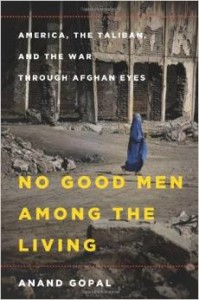
Everybody's Got Afghanistan Wrong
I've just read an excellent new book by Anand Gopal called No Good Men Among the Living: America, the Taliban, and the War Through Afghan Eyes. Gopal has spent years in Afghanistan, learned local languages, interviewed people in depth, researched their stories, and produced a true-crime book more gripping, as well as more accurate, than anything Truman Capote came up with. Gopal's book is like a novel that interweaves the stories of a number of characters — stories that occasionally overlap. It's the kind of book that makes me worry I'll spoil it if I say too much about the fate of the characters, so I'll be careful not to.

The characters include Americans, Afghans allied with the U.S. occupation, Afghans fighting the U.S. occupation, and men and women trying to survive — including by shifting their loyalties toward whichever party seems least likely in that moment to imprison or kill them. What we discover from this is not just that enemies, too, are human beings. We discover that the same human beings switch from one category to another quite easily. The blunder of the U.S. occupation's de-Baathification policy in Iraq has been widely discussed. Throwing all the skilled and armed killers out of work turned out not to be the most brilliant move. But think about what motivated it: the idea that whoever had supported the evil regime was irredeemably evil (even though Ronald Reagan and Donald Rumsfeld had supported the evil regime too — OK, bad example, but you see what I mean). In Afghanistan the same cartoonish thinking, the same falling for one's own propaganda, went on.
People in Afghanistan whose personal stories are recounted here sided with or against Pakistan, with or against the USSR, with or against the Taliban, with or against the U.S. and NATO, as the tides of fortune turned. Some tried to make a living at peaceful employment when that possibility seemed to open up, including early-on in the U.S. occupation. The Taliban was very swiftly destroyed in 2001 through a combination of overwhelming killing power and desertion. The U.S. then began hunting for anyone who had once been a member of the Taliban. But these included many of the people now leading the support of the U.S. regime — and many such allied leaders were killed and captured despite not having been Taliban as well, through sheer stupidity and corruption. We've often heard how dangling $5000 rewards in front of poor people produced false-accusations that landed their rivals in Bagram or Guantanamo. But Gopal's book recounts how the removal of these often key figures devastated communities, and turned communities against the United States that had previously been inclined to support it. Add to this the vicious and insulting abuse of whole families, including women and children captured and harassed by U.S. troops, and the revival of the Taliban under the U.S. occupation begins to become clear. The lie we've been told to explain it is that the U.S. became distracted by Iraq. Gopal documents, however, that the Taliban revived precisely where U.S. troops were imposing a rule of violence and not where other internationals were negotiating compromises using, you know, words.
See Especially:
DefDog: Understanding Afghanistan
Review: Making Friends Among the Taliban
Review: Surrender to Kindness (One Man’s Epic Journey for Love and Peace)
Review: Taliban — The Unknown Enemy
Review: Wrong Turn – America’s Deadly Embrace of Counterinsurgency
See Also:



